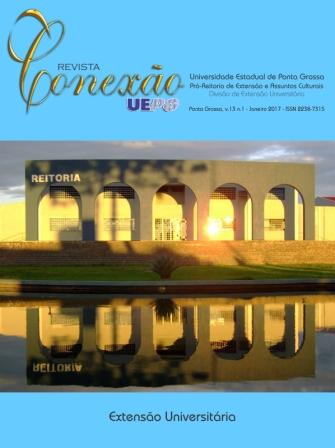THE CONTRIBUTION OF UNIVERSITY EXTENSION IN ACADEMIC EDUCACION: CHALLENGES AND PROSPECTS - DOI: 10.5212/Rev.Conexao.v.13.i1.0004
DOI:
https://doi.org/10.5212/Rev.Conexao.v.13.i1.0004Keywords:
university extension, epistemology, human education.Abstract
This study aims at analysing how teachers express the nature of the extension activity in their projects, using the approaching and distancing of the university extension potential as an education device inspired in the praxis as a parameter of analysis. The empirical field comprised the extension actions proposed by teachers in the education scenery of the State University of Rio Grande do Norte, through the workload notice for 2016. 14% of the proposals approved in 2016 were selected, in which the items below were analysed: the inextricable connection between teaching-research-extension and the extension nature and evaluation. The importance of a formative dialogue which enables the discussion of the concept of extension in the perspective of broadening senses, for some transformation in the evolution of a teaching posture with dialogical education, through plural knowledge that permeate the University insideoutside.
Downloads
References
OLIVEIRA, Inês Barbosa. Currículos praticados em tempos de globalização: o cotidiano escolar e seus condicionantes na criação de alternativas emancipatórias. In: ______. (Org.). Práticas cotidianas e emancipação social: do invisível ao possível. Petrópolis, RJ: DP et al., 2010.
ALVES, Nilda.Decifrando o pergaminho oscotidianosdasescolasnaslógicasdas redescotidianas.In: ALVES, Nilda;OLIVEIRA,InêsBarbosa(Orgs.).Pesquisa nos/dos/com os cotidianos das escolas. 3. ed. Petrópolis: DP&A, 2008.
ARDOINO, Jacques. Abordagem multirreferencial (plural) das situações educativas e formativas. In: BARBOSA, J. (Org.). Multirreferencialidade nas ciências e na educação. São Carlos: EDUFScar, 1998.
CERTEAU, Michel de. A invenção do cotidiano: artes de fazer. 19. ed. Tradução de Ephraim Ferreira Alves.Petrópolis, RJ: Vozes, 2012.
FAZENDA, Ivani C. A. Práticas interdisciplinares na escola. 13. ed. São Paulo: Cortez, 2013.
FREIRE, Paulo. Pedagogia da autonomia: saberes necessários à prática educativa. São Paulo: Paz e Terra, 1998.
JOSSO. Marie-Christine. Experiências de vida e formação. Tradução de José Claudio e Júlia Ferreira. Natal, RN: Edufrn; São Paulo: Paulus, 2010.
LÜCK, Heloísa. Pedagogia Interdisciplinar: fundamentos teórico-metodológicos. 14. ed. Petrópolis, RJ: Vozes, 2007.
MACEDO, Roberto Sidnei. Outras luzes: um rigor intercrítico para uma etno pesquisa política. In: MACEDO, Roberto Sidnei; GALEFFI, Dante; PIMENTE Álamo. Um rigor outro: sobre a questão de qualidade na pesquisa qualitativa. Salvador: Edufba, 2009, p. 75-126.
______. Compreender/mediar: o fundante da educação. Brasília: Liber livro, 2010.
OLIVEIRA, Inês Barbosa. Boaventura e a educação. Belo Horizonte: Autêntica, 2008.
POLÍTICA NACIONAL DE EXTENSÃO UNIVERSITÁRIA. Fórum de Pró-Reitores de Extensão das Instituições Públicas de Educação Superior Brasileiras. FORPROEX, Porto Alegre. 2ª imp., ago.2013.
REIS, Marlene Barbosa de Freitas. Interdisciplinaridade na prática pedagógica: um desafio possível. Revista de educação, linguagem e literatura da UEG, Inhumas, v. 1, n.2, out. 2009. Disponível em: http://pt.slideshare.net/edselma/texto-interdisciplinaridade-napraticapedagogica Acesso em: 03 mar. 2016.
RIBEIRO. Mayra R. Fernandes. A sala de aula no contexto da cibercultura: formação docente e discente em atos de currículo. 207 f. 2015.Tese (Doutorado) – Universidade do Estado do Rio de Janeiro, UERJ,Rio de Janeiro, 2015.
SANTOS. Boaventura de Sousa. Conhecimento prudente para uma vida decente: um discurso sobre as ciências revisitado. São Paulo: Cortez, 2004.
______. Para além do Pensamento Abissal: das linhas globais a uma ecologia de saberes. In: SANTOS, Boaventura de Sousa; MENESES, Maria Paula. Epistemologias do Sul. Lisboa: Almedina, 2010.
Downloads
Published
Issue
Section
License
a) Authors retain copyright and grant the journal right of first publication with the work simultaneously licensed under a Creative Commons Attribution License that allows others to share the work with an acknowledgement of the work's authorship and initial publication in this journal.
b) By submitting an article to the Revista Conexão UEPG and having it approved, the authors agree to assign, without compensation, the following rights to the Journal: the rights of first publication and the rights to redistribute the article and its metadata to the indexing and reference services that the editors deem appropriate.
c) Readers are free to transfer, print out and use the articles published in the Journal, as long as there is always explicit mention to the author(s) and to the Revista Conexão UEPG and as long as there is no alteration of the original work. Any other use of the texts needs to be approved by the author(s) and by the Journal.






